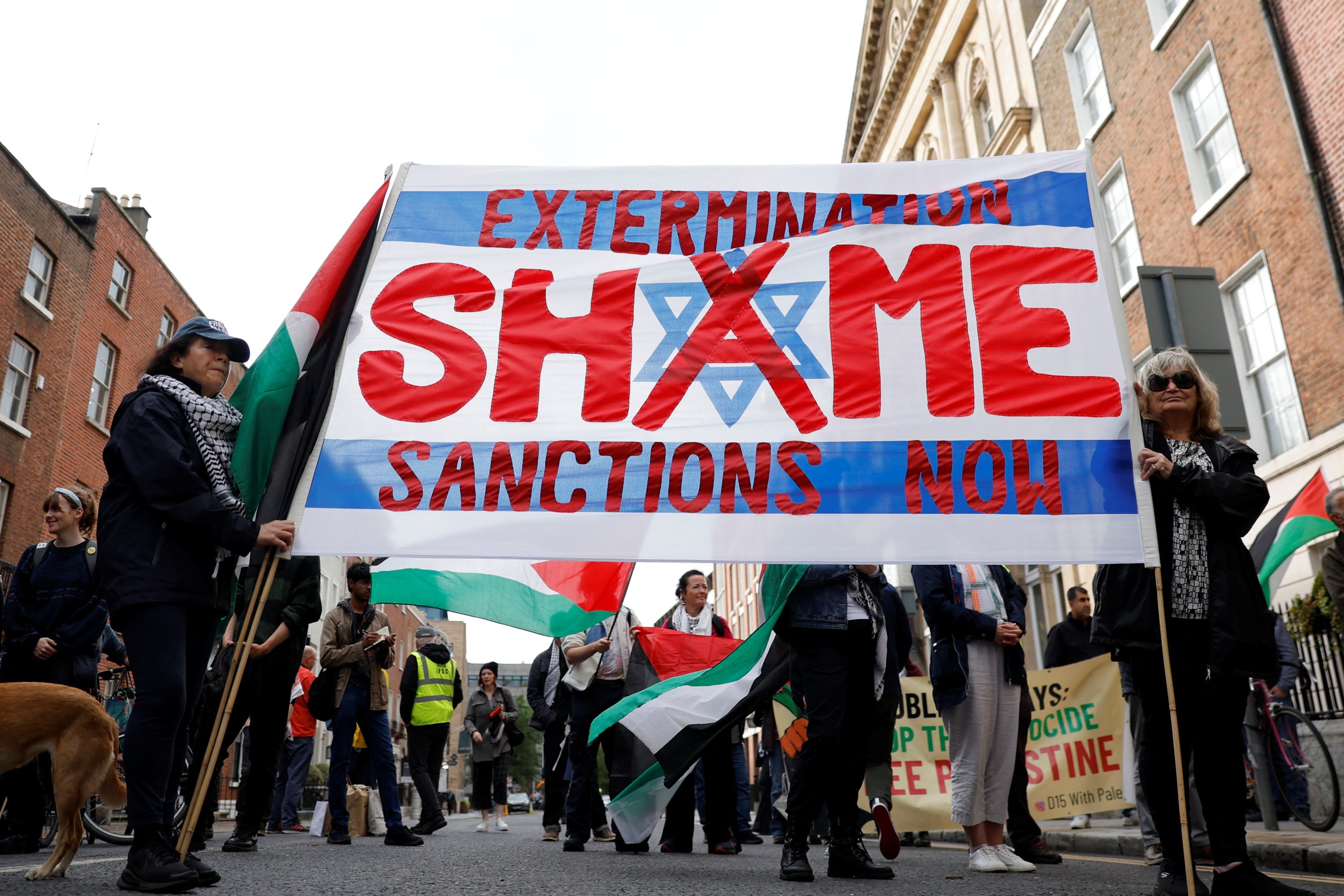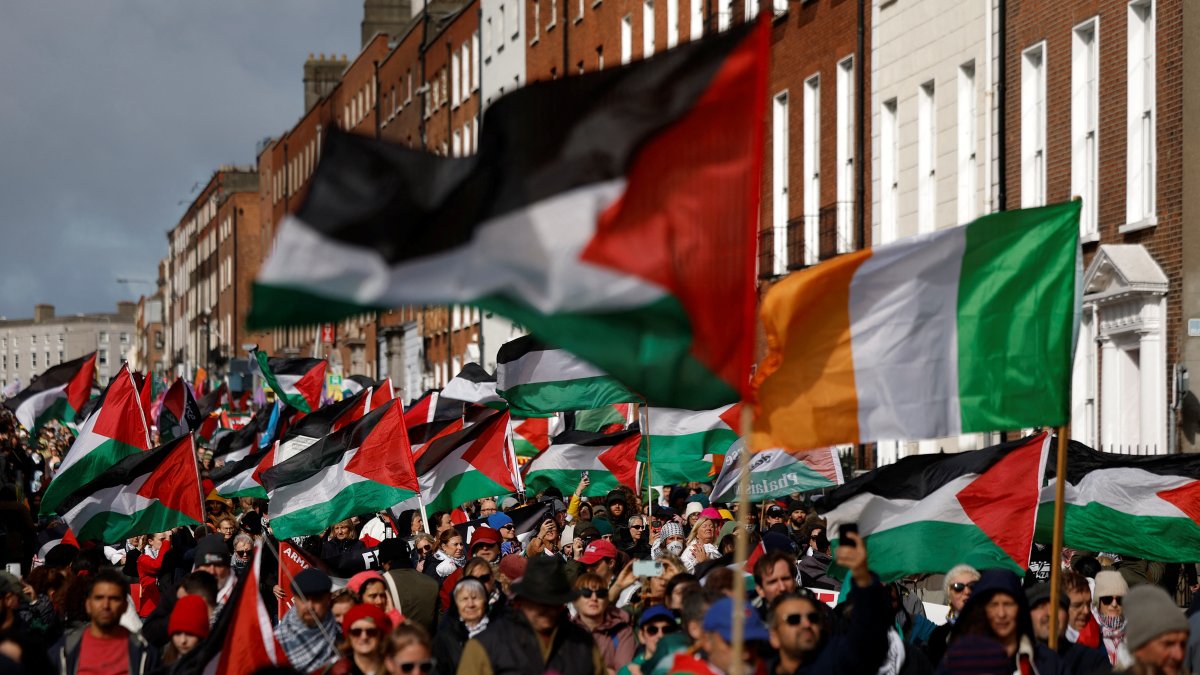Ireland has undoubtedly been one of the countries that most deserve appreciation for its stance during the ongoing genocide. In fact, it is known for its long-standing closeness to the oppressed Palestinian people. It was the first to call for a Palestinian state in 1980 and was the last European Union country to allow an Israeli Embassy to open in 1993.
Why Ireland opposes Israel
Recently released documents have revealed that Israeli Prime Minister Netanyahu, then a young deputy foreign minister, lobbied for the opening of an embassy in Dublin. In 1990, then-Irish Foreign Minister Gerry Collins said their sympathy for Israel was damaged by “cases of Irish troops being brought home dead from Lebanon.”
The issue Collins mentioned occurred in 1978, when Irish soldiers were deployed to Lebanon as part of the United Nations Interim Force in Lebanon (UNIFIL) for peacekeeping. At the time, Lebanon was once again a battlefield involving Israeli forces, their proxies and Lebanese guerrillas. Between 1978 and 2000, Ireland sent over 40,000 troops to Lebanon as part of the UNIFIL mission, marking Ireland’s largest military involvement outside its own borders. However, the mistreatment of Irish soldiers by the Israel Defense Forces (IDF) severely strained relations between Ireland and Israel.
Yet, it is also understood that the issue goes beyond these incidents, as many Irish people draw a historical parallel between their own past struggles and the plight of the Palestinian people.
In March 2024, Ireland’s then Taoiseach (Prime Minister) Leo Varadkar explained: “When I travel the world, leaders often ask me why the Irish have such empathy for the Palestinian people … And the answer is simple: We see our history in their eyes – a story of displacement, of dispossession and national identity questioned and denied, forced emigration, discrimination and now hunger.”
Aislin Walsh, an Irish scholar who specializes in colonialism, emphasized the similarity between the two nations in an op-ed for Al Jazeera: “The apparatus of occupation – armed military patrols on city streets, military checkpoints, segregated cities and separation walls – that shape daily life today in occupied Palestine is almost identical to the one once utilized by the British in Northern Ireland.”
One of fair few
Ireland maintained its historically supportive stance toward Palestine through concrete actions during the ongoing conflict that began on Oct. 7, 2023. In May 2024, Ireland, along with Spain and Norway, officially recognized the State of Palestine. While this recognition was anticipated, Israeli Prime Minister Benjamin Netanyahu condemned the move as a “reward for terrorists.” Nevertheless, these countries stood firm and proceeded with the recognition. In response, Netanyahu closed the Israeli embassy in Ireland, which he had previously pushed to establish.
Following months of diplomatic efforts by Ireland, Spain and Norway, the majority of remaining European countries eventually followed suit and recognized Palestine. This development further highlighted the significance of Ireland’s leadership on the issue.
In October 2024, Ireland and Spain urged other members of the EU to respond to their request to suspend the bloc’s free trade agreement with Israel over its actions in Gaza and Lebanon. Recently, we learned that Ireland is poised to become the first EU country to legislate a ban on trade with illegal Israeli settlements in the occupied West Bank and East Jerusalem.
Last July, Sinn Fein leader Mary Lou McDonald told Anadolu Agency that “legislation is being prepared by the Irish government. We want that to be as strong as possible.”
On Aug. 12, the Irish foreign minister reiterated Ireland’s demand to suspend an EU-Israel Association Agreement. The European Commission has unveiled plans to restrict trade with Israel and impose sanctions on extremist ministers in its government.
In a press release, Taoiseach Micheal Martin on Sept. 17, said that: “I strongly welcome the Commission’s decision today to propose suspension of parts of the EU’s Association Agreement with Israel. Ireland has long called for this action and the findings of the U.N. Commission of Inquiry that Israel is committing genocide in Gaza make action even more urgent. … I will be calling on all Member States to support these measures when they are voted on in the Council. Israel is clearly in breach of its obligations under the Association Agreement with the EU and under international law, and there can be no business as usual. The proposal to sanction certain ministers of the Israeli government, as well as violent settlers, is also an action that Ireland will support.”
In addition, Irish Member of European Parliament, Cynthia Ni Mhurchu, spoke at the European Parliament’s Petitions Committee on Sept. 25 to call for an urgent review of the EU-Israel Association Agreement.
The Irish officials have also been careful to keep the genocide on the agenda. Irish President Michael Higgins mentioned Gaza and spoke in support of a cease-fire with Hamas at a Holocaust commemoration event, which made Jews outraged. But the Irish government remained unmoved and soon called for the blockade to be lifted.
They did not shy away from making harsh statements either. Taoiseach Martin said in May that “the world is now sickened and absolutely disgusted with the level of bombing, and starvation that is ongoing in Gaza.” Indeed, this is a stance not seen in many governments of Muslim countries.

People hold banners and flags outside government buildings during a demonstration in support of Palestinians, Dublin, Ireland, Sept. 18, 2025. (Reuters Photo)
Criticisms on scale
Despite these efforts, some believe that sufficient measures have not yet been taken against Israel. In 2024, news broke that “Ireland’s sovereign investment fund is to divest from six Israeli firms.” However, by July 2025, The Journal revealed that the Irish sovereign wealth fund had pumped millions into companies contracted by the IDF. It was reported that the IDF utilized petrol stations owned by Delek Group in the occupied territories and that Ireland’s sovereign wealth fund held millions of dollars in this company. Although this issue appears to have been addressed, according to earlier statements, the sovereign wealth fund still retains some holdings in Delek Group.
Furthermore, in August 2024, Irish military sources informed The Irish Times that there were “no restrictions” on purchasing military equipment from Israel, a disclosure that was met with criticism. Nevertheless, these negative aspects seem to carry less weight when weighed against the numerous positive steps Ireland has taken on the issue.
Commendable sensitivity
Aside from the political will, the examples of sensitivity displayed by the Irish people have been awe-inspiring. The scene of a newlywed couple rushing to a rally for Gaza immediately after the ceremony, dressed in their wedding and groom’s suits, is one of the most touching scenes I have seen in relation to protests happening around the world.
Some of the Irish people’s generous donations are also receiving attention in the Turkish media. For example, it was recently reported that a rug retailer company, Kukoon, donated a day’s worth of revenue, valued at 180,000 pounds ($242,824), to Gaza. Many similar reports have appeared in Türkiye.
In fact, a certain degree of closeness between the Turks and the Irish can be said to have its roots in the past. When Ireland faced a devastating famine in 1847, the Ottoman Empire was not indifferent; it provided food and financial aid. Not content with simply aiding the Irish people, it also shipped hay for their livestock from the Port of Shkodra. For this aid, Queen Victoria of England sent a letter of thanks, which remains in the Ottoman archives. Similarly, the Irish delegation traveled to Istanbul to present a letter of thanks.
Shortly thereafter, Colonel Thomas Polson defended the rights of the Ottomans against both Russia and the Greeks through the Fermanamil newspaper he published in Ireland, for which the sultan awarded him a medal in 1880.
During the Turkish War of Independence, the two sides tended to support each other due to their common enemy being the U.K. (For more detailed information, see professor Mehmet Temel’s article, “Irish Revolution in the Ottoman Archive Documents.”)
It is also claimed that this relationship has left some lasting traces, and the crescent and star on the coat of arms of the Irish town of Drogheda originate from Sultan Abdülmecid’s aid during the famine. Irish President Mary McAleese, who visited Türkiye in 2010, also mentioned this. However, some have objected, making it a controversial issue. Nevertheless, it can be said that this symbolism has had an impact on both Irish and Turkish perspectives. (Professor Mehmet Temel’s and Muhsin Kadıoğlu’s article, “Origins of the ‘Crescent-Star’ Symbol of the Irish Town of Drogheda,” is helpful on this topic.)
In short, just as Ireland’s humanitarian stance is remembered as a commendable chapter in history, such historical examples have also strengthened our mutual goodwill with the hope of forging even more positive chapters together, particularly in standing against the Israeli perpetrators of genocide in the future.

